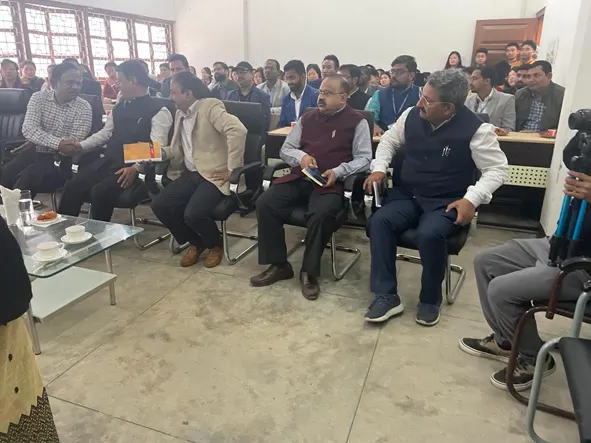RONO HILLS, 29 Feb: The agricultural sciences faculty of Rajiv Gandhi University (RGU) celebrated the National Science Day-2024, themed ‘Indigenous Technologies for Viksit Bharat’, here on Wednesday.
Delivering a talk on the occasion, Himachal Pradesh Technical University Vice Chancellor Prof Shashi Kumar highlighted the achievements of Prof CV Raman. He particularly stressed on how Prof Raman “deciphered the phenomenon of scattering of light, which led him to earn a Nobel Prize.”
Prof Kumar also shed light on “the importance of science and how we can shoulder the responsibility as scientists to carry on the legacy of science in India.”
RGU VC Prof Saket Kushwaha in a message said that science is “deep-rooted in our Indian culture from ancient times,” and encouraged the students and faculty members to “work tirelessly in the pursuit of scientific knowledge and wisdom to harness the indigenous technologies to achieve the goals for Viksit Bharat.”
He stressed also on “survey, evaluation, documentation and conservation of millets germplasm,” and on “providing a millet meal every day in university hostels.”
The programme saw the participation of students, faculty members and other staffers of various departments of the agriculture sciences faculty.
“The students presented posters, and showcased some of the indigenous practices and scientific interventions, and ethnic food products requiring scientific advancement,” the university informed in a release.
The event also featured showcasing of “farming implements and in-house cultivation of anthocyanin and carotene rich bio-fortified cauliflowers and alder-based jhum cultivation for sustainable agriculture practice,” it said, adding that “indigenous phytopathological practices adopted to manage the diseases of crop plants were also presented.”
“This ITK’s includes using botanical extracts and decoctions commonly found in this region having antimicrobial activity. Further, indigenous paddy-cum-fish culture and indigenous salt-making techniques of the Apatani and the Nocte tribes of Arunachal Pradesh were also showcased,” the release stated.
“Various ethnic foods, such as soft cheese, iodine rich alkaline water (pila), sun dried persimmons, dried spices, and fermented black rice beverages were highlighted that required scientific interventions,” it said.
“Agricultural Sciences Dean Prof Sumpam Tangjang spoke on the importance and conservation of indigenous technologies for sustainable development,” the release added.



